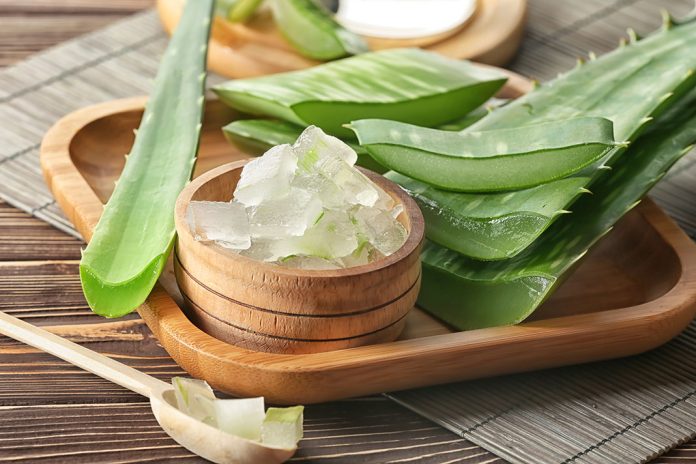Eczema and atopic dermatitis are conditions characterized by inflamed, itching, cracked, or rough skin areas. They can also cause blisters. Everyone’s eczema is unique, and flare-ups will not always occur in the same area of the body. Regardless, flare-ups are usually uncomfortable and require treatments to help you manage, so your doctor may prescribe medications like Otezla (Apremilast), Dupixent (Dupilumab) or Cibinqo (Abrocitinib). Many people with eczema can control their symptoms with natural gels or oils, medicinal baths, and lifestyle modifications, such as changing their diet. Here are several natural remedies to help manage eczema symptoms:
1. Aloe vera
Aloe vera possesses antibacterial, antifungal, and anti-inflammatory properties that can help relieve eczema symptoms without causing further skin irritation. When buying aloe vera, search for a product with a high concentration of this medicinal plant’s extract.
2. Apple cider vinegar
Eczema sufferers may find relief in a lukewarm bath with 2 cups of apple cider vinegar (ACV). Eczema arises when the acidic barrier of the skin fails to function correctly, which can lead to drying and itchiness. As such, adding ACV to a bath may be able to briefly help the skin’s acid levels return to normal because of its moderate acidity. However, there isn’t much scientific evidence to support ACV as an eczema treatment, so it’s still recommended to consult with your doctor first.
3. Oatmeal baths
Colloidal oatmeal is produced by grinding and boiling oats to extract the skin-healing qualities, including natural emollients that soothe irritated, reddened skin and reduce discomfort. Colloidal oatmeal is accessible in a powder form that may be easily sprinkled into a hot bath. For optimal results, soak for about 15 minutes, pat the skin dry with a towel, and apply your preferred moisturizer.
4. Coconut oil
Coconut flesh is the source of coconut oil. It can also be utilized as a natural moisturizing agent. As per the National Eczema Association, this fruit’s antibacterial properties can decrease staph germs on the skin, preventing infection. This is critical for eczema patients because irritated skin patches can break and leak, allowing germs to enter and causing infection. For best results, choose chemical-free virgin and cold-pressed oil for topical application.
5. Honey
When applied topically, honey’s antimicrobial, antifungal, antiviral, and anti-inflammatory qualities can be a potentially helpful eczema remedy. Honey is also a humectant, which means that it helps in hydrating the skin. Additionally, it assists in the healing of wounds by keeping the area around the wound wet and acting as a barrier. Since it contains organic acids, it also has a mild exfoliating effect. There has only been a small amount of study conducted on the efficiency of honey in managing the symptoms of eczema and atopic dermatitis; however, some research suggests it might be an excellent home cure. When applied to eczema sores, manuka honey can also enhance the skin’s appearance and reduce irritation.
6. Tea tree oil
Tea tree oil is produced by distilling Melaleuca alternifolia leaves, which are native to Australia, into an oil. People frequently use this oil to treat various skin conditions, including eczema. The oil offers qualities that help heal wounds, reduce inflammation, and fight infections. It can also alleviate symptoms of dry skin or itching while preventing infections. Before applying essential oils directly to the skin, you should always dilute the oil using a carrier oil, like almond or olive oil.
If your eczema is bad or isn’t improving with home remedies, you should see a doctor. If a toddler or newborn gets a new rash, seek immediate medical assistance.



